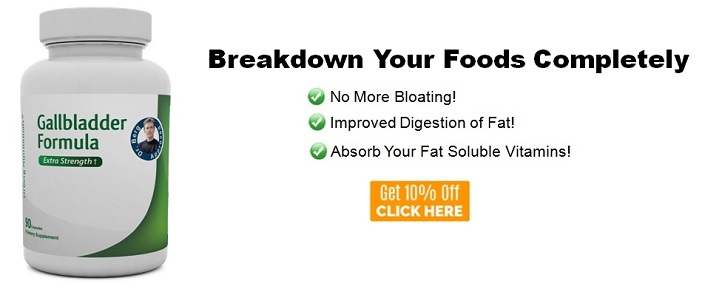Lose Serious Weight with Ketosis Live Webinar
Lose Serious Weight with Ketosis
Dr. Eric Berg
Ketosis: It Works for Those Really Struggling with Weight Loss
Ketosis is good for all my clients who have tried everything and nothing worked. Some people cannot lose weight no matter how hard they try. A lot of people are carb-sensitive.
Today, I want to address paleo versus ketosis, what kind of fats you can eat, and if they're dangerous.
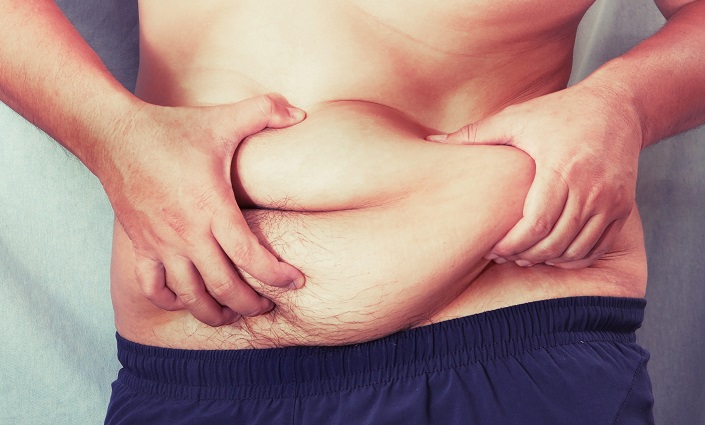
Everything in Moderation Is Not Okay
One of the most dangerous concepts out there for those trying to lose weight is that 'everything in moderation' is okay. This isn't true for weight loss. You have to really attack weight loss head on if you want to lose serious weight and belly fat, especially after the age of 40.
Addressing Negative Myths about Ketosis
Some of the anti-ketosis practitioners out there (almost every single one of them, in fact) might do research with rats, but I'm working with people.
I'm totally convinced that the majority of information being put out in conventional medicine is the exact opposite of what you want to do. When eating less calories yet your burning of fat does not work, you have to start thinking outside of the box.
Is Ketosis Safe?
I think it's really healthy- one of the healthiest things you can do. For neuroprotective aspects, preventing Alzheimer's and Parkinson's, the brain loves this. Serious research has found all kinds of benefits of ketosis. The brain loves ketons for fuel.
The state of ketosis is very good for any kind of issues such as diabetes, brain disorders, and cancer.
Cancer cells live on sugar. PET scans actually look for parts of the body living off of sugar.
If I had cancer, I'd eliminate all sugars.
It is also good for acne, POCS, and especially weight loss.
Studies prove that when you consume dietary fats, it does not, in any way, shape, or form, affect cardiovascular health. The brain loves healthy fat.
Fat = Stuck Energy in a Fat Cell
When we're dealing with excess, stubborn fat, we're dealing with stuck energy in the fat cell.
I want to move beyond the conventional viewpoint that all you have to do is to balance calories, burn more than you're eating, and you'll lose weight. When you get past 35 or 40, it wouldn't work.
See, we have sugar fuel and fat fuel. Ketosis means the body is burning fat. It's using ketones as a byproduct of burning fat. Ketones are a fuel for energy, but it's a much cleaner fuel and it doesn't cause diabetes, high blood sugar, and Fat Storing Hormone resistance.
The amount of sugar in your blood is 2 teaspoons. If your blood sugar is higher than 100, that's hyperglycemia; lower and it is hypoglycemia.
What are the symptoms of high blood sugar?
You get brain fog, exhaustion, blurred vision, thirst, and cold sweats. So those are some of the symptoms of having high blood sugar. The need to urinate often and being hungry easily are included.
What are the symptoms of low blood sugar?
Being shaky, sweating, dizziness, anxiety, irritability, cravings for sugar, weakness, and vision problems.
Running on ketosis is good for stress, energy, controlling appetite...
The brain is very greedy. It's only 2% of your body, but it eats up 20% of your energy. You'll hear that the brain runs on sugar, but it can switch to ketones when there's no sugar in the bloodstream.
You have a storage of sugar, mainly in the liver and in the muscles.
The muscle has stored sugar, but it's only used for the muscle. The muscle won't give up any of its stored sugar to the body.
The liver- the liver stores about 7 tablespoons of sugar- enough to last for 72 hours. If you ate nothing, you would be dead in 72 hours, but you have a backup fuel system- FAT. This is why getting into ketosis helps you burn fat.
Here's the thing about what I mean by diabetes. Type I is where the pancreas isn't making enough Fat Storing Hormone to lower your Fat Storing Hormone.
Type II is when your Fat Storing Hormone receptors stop listening to Fat Storing Hormone and your blood sugar stays high because the Fat Storing Hormone is there but not being taken up by the cells.
Here's the Big Question:
Does anyone know what the purpose of fat is? It's there to protect your organs. The primary purpose of fat is to be a survival gland to protect against the starvation of SUGAR.
So it protects you against sugar starvation. It's a backup organ for sugar. Really, because you wouldn't last for more than 72 hours without food, we store fat in case of starvation.
So, to get the fat off your body, you need to starve your body of SUGAR.
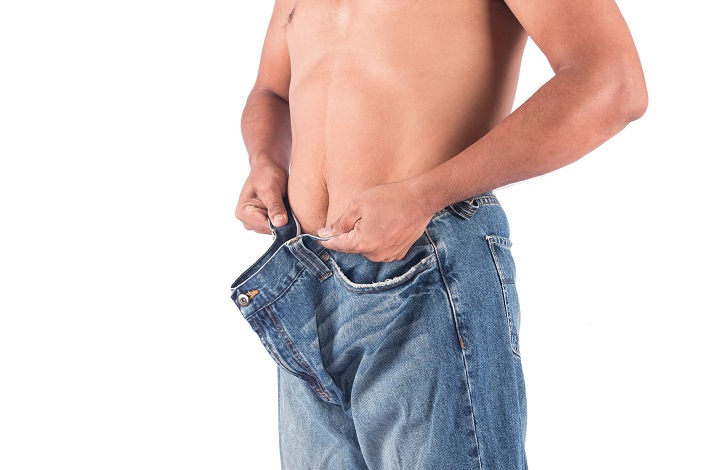
Knowing this, we know that it's the best to be on a ketosis diet, right. Reducing calories and exercising more, but according to the diet, 'Weight Watchers, Slim Fast', you'll never burn fat. You'll lose water weight, but not fat. We must starve the body of sugar and replace it with more healthy fats, which are much more satisfying to the body.
First, we must bring carbs down to five calories = 50 grams of carbohydrate a day.
What Are Net Carbs?
So, what is a net carbohydrate? Look at the back of a label. Look at total carbs and minus the fiber. That's the NET CARBS.
Broccoli has about 10 grams of carbohydrate. But it has 3.8 grams of fiber. So you get 6.2 grams of carbohydrate. An apple has 25 grams of sugar. And it has 4.4 grams of fiber. So that means it's 20.6 grams of carbohydrate. So you can only get away with about 2 and ½ apples a day. So, most people will want to stick with vegetables.
So, I'm not recommending apples for weight loss- maybe for weight maintenance. Apples don't have enough fiber- 19 of the total sugar grams are going to be taken up by the body.
Now, celery has 1.2 grams of carbohydrate only. Only 6 grams of fiber, so only ½ gram of carbs. So you can literally feast on celery and not spike Fat Storing Hormone all day.
WE MUST STARVE THE BODY of SUGAR.
Protein
Needed for raw material for tendons, bones, ligaments, cholesterol transportation, hormones, high density lipoproteins- these are the shuttles to move cholesterol around. The problem with protein is we want moderate protein. Too much and we will spike Fat Storing Hormone. So, limit protein to 3 to 6 ounces. Too much protein also strains the liver and the kidneys.
We want to adjust the protein to their size and to their adrenal health.
So, again, 3-6 ounces a meal. With Atkins, they take a lot of protein. With ketosis, it's a moderate protein. It keeps your carbs down, protein constant, and fat higher.
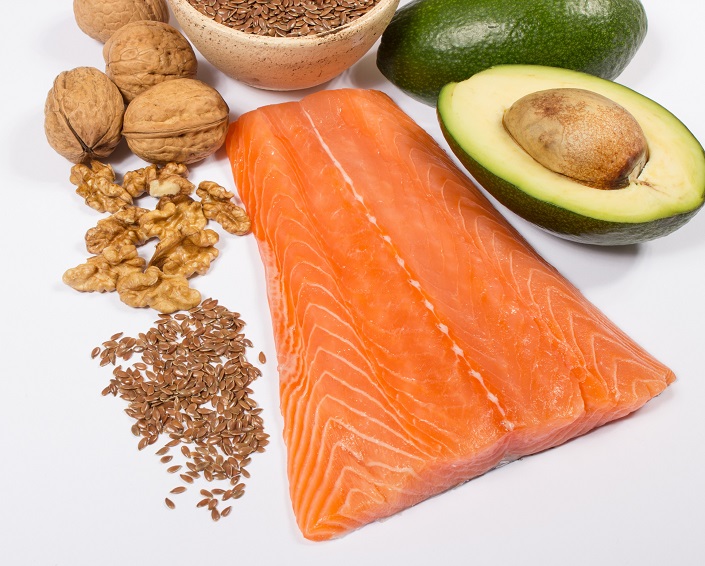
We've been taught that fat is bad. But having fat in the diet, with the right amount, will not raise Fat Storing Hormone. Fat does not raise Fat Storing Hormone at all.
The right fats satisfy the brain and give you fat-soluble vitamins. If you eat kale, see, that's only the precursor to vitamin A. You need animal fats to absorb the vitamin A. Kerrygold butter will give you the fat to convert that vitamin A. You'd only convert around 5% of the vitamins from vegetables.
We need fat-soluble vitamins. Consume butter with carrots, for example, and you give it the fat it needs to convert those vitamins.
When you get on ketosis, we want you to burn the fat you're eating AND tap into your reserves as well.
You will have to adjust the fats to your activity levels. If you're sedentary and have a poor metabolism, you won't be able to have the same amount of fat. You can have some, not a lot.
Why do we need fat to burn fat?
This is because the body considers fat as a survival mechanism. It will hold onto its own fat more when you starve it of fat. If you have no dietary fats, you starve the body of ketones and the structural fats it needs to surround the cells of your body and of the nerves. So you starve the structural fats and develop problems with the immune system.
If you go on a low-carb, low-fat, and high-protein diet, you would still spike Fat Storing Hormone and stress the kidney and liver on top of it.
If you go on a low-carb, low fat, low protein, there would not be enough fat to stimulate ketosis, so the body will go after the muscles.
Really, the ideal situation is to have about 5% carb, 20-25% being protein, and the rest being fat. Then adjust the quantities. Fat keeps the body out of stress.
Eating sugar puts your body into fight or flight mode all the time. It's a sudden burst of energy that sends your body up and down all the time.
So where do you get vitamin A, K, and K2? Vitamin D can be from the sun, nuts, seeds, and oils while vitamins K and A can be from cod liver oil.
K2 is crucial for a lot of health problems, making your arteries elastic, to clean up the arteries. Grass-fed beef! It's a recently discovered vitamin, but it makes sense that putting your body into ketosis, this will make you crave those fats that had all the vitamins you need now.
Healthy Fats
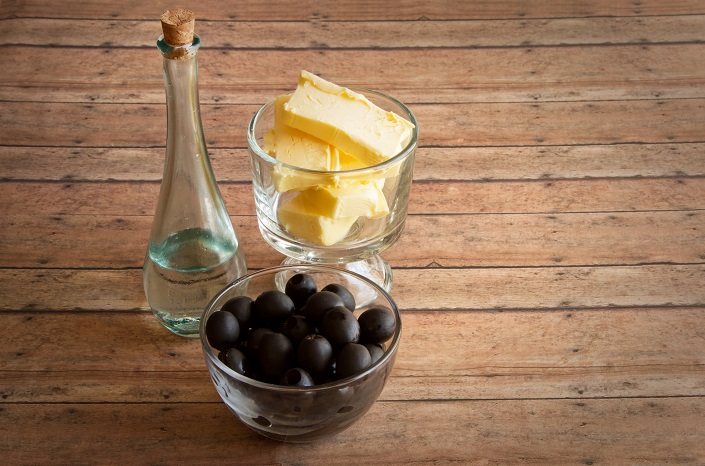
The types of fats that are good for the liver and for the gallbladder are the MCT- that means butter, cheese, eggs, and beef from grass-fed animals, coconut butter, and olive oil. These are the ones you'll have to eat. You may want the fattier beef, and you may want the fat on the meat. It will give your brain more energy.
Ketones are only made, and ketosis only occurs when the body is starving of carbohydrates.
When you start eating more fat, your digestive system will do much better.
In a recent study, "The Long Term Effects of a Ketogenic Diet on Obese Patients", it says it "did not produce any negative side effects" and it's "safe to use for longer periods."
I also have some "keto bomb" recipes you might want to try. The Gallbladder Formula has all three component parts so it handles all parts of the digestion.
Digesting Fats, Breaking Down Fat, and Why You Need Pancreatic Enzyme Help
Since you'll be eating a lot more fat now, you might need help digesting all the fats you'll be dumping through the body.
And the body takes time to adjust to the burning of fat, and it will take time to develop the enzymes to break down all these fats. So I changed my Gallbladder Formula!
I added pancreatic enzymes to help everyone break down fats all the way down to the smallest molecular level possible.
Taking the Gallbladder Formula also helps with all the fat you're dumping.
You may also want to add sea salt from dumping all the sugar out of the body.
I also recommend a calcium/magnesium supplement before bed and magnesium will help you sleep, too.
So, we want to make sure the minerals are there to digest the fats, keep the constant low carbohydrate, moderate protein, and adequate fats. We want to adjust the fats to your activity level as well.
But going into ketosis, you won't have cravings and hunger and you won't have that appetite you had to fight so hard against before.
Overall, you may want 50 net carbohydrates a day.
Don't be discouraged if you don't get into ketosis right away. It can take 2 to 4 weeks.
For sweeteners, birch bark-derived xylitol is a great sweetener. Stevia and xylitol, too.
If you love coffee, having coffee with xylitol is fine. Full-fat cream has no carbohydrate and does not spike Fat Storing Hormone, so that is fine, too.
Thanks, guys! I'd love to hear from you below!
-Dr. Eric Berg
Previous blog
The OTHER Reasons Why People Can't Lose WeightTags

Popular
08/21/2024
40.6K views
05/22/2024
37K views
11/18/2024
215.8K views
03/18/2024
11/21/2022
